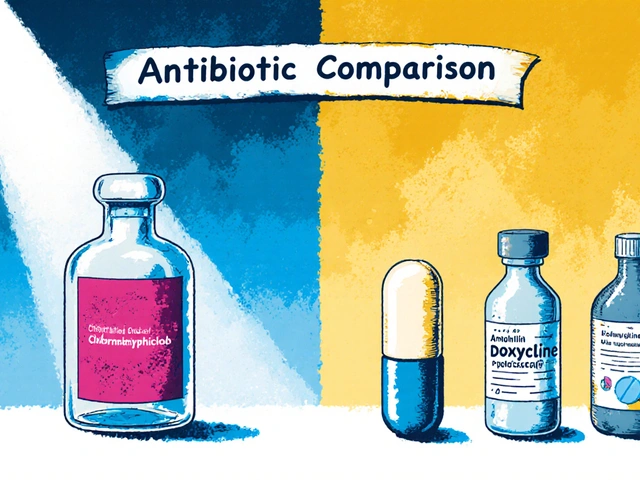SSRI options: quick guide to choosing the right one
Picking an SSRI can feel overwhelming. They all target serotonin, but each drug behaves a little differently. This guide cuts through the noise so you can talk to your doctor with confidence.
Common SSRI types and what makes them different
Here are the SSRIs you’ll hear about most and the practical differences that matter:
Fluoxetine (Prozac) — long half-life, so stopping it usually causes fewer withdrawal symptoms. Good when you want a steady drug that’s forgiving if you miss a dose.
Sertraline (Zoloft) — often a first choice: effective for depression and anxiety. Some people notice stomach upset early on, but it usually settles.
Escitalopram (Lexapro) & Citalopram (Celexa) — escitalopram is considered very tolerable and effective at lower doses. Citalopram is similar but may be limited by dose-related heart rhythm checks in some patients.
Paroxetine (Paxil) — can be calming but has a higher risk of weight gain and withdrawal symptoms when stopped suddenly. Often not first-line for young people or those planning pregnancy.
Fluvoxamine — commonly used for obsessive-compulsive disorder. It interacts with many medications, so clinicians check drug lists carefully before prescribing.
How to pick an SSRI — practical factors to discuss
Think about these clear, real-world issues when choosing:
Speed of effect: SSRIs usually take 2–6 weeks to help. If you need faster relief, your clinician might add another treatment temporarily.
Side effects you want to avoid: sexual side effects, weight changes, sleepiness or activation (feeling jittery). Each SSRI has different odds of causing these.
Withdrawal risk: drugs with short half-lives (like paroxetine) cause more withdrawal, while fluoxetine causes less.
Other meds and interactions: SSRIs interact with blood thinners, some pain meds, and MAOIs. Always share your full medication list with your prescriber and pharmacist.
Special situations: pregnancy, breastfeeding, liver or heart issues change which SSRI is safest. Your doctor will tailor the choice.
Practical starting rule: start low, go slow. If one SSRI doesn’t help after an adequate trial (usually 6–8 weeks at a therapeutic dose), your clinician may raise the dose, switch, or add another treatment.
Quick checklist to bring to your appointment:
- Main symptoms and how long you’ve had them
- Current medications, supplements, and alcohol use
- Past responses to antidepressants, if any
- Concerns about side effects (weight, sex drive, sleep)
When to call your doctor: worsening mood, suicidal thoughts, new severe side effects, or symptoms like high fever, stiff muscles, or fast heartbeat (these need urgent care).
Want a specific recommendation? Tell your provider about your priorities—sleep, weight, pregnancy plans, or interactions—and they’ll suggest the best SSRI for your situation. If the first choice doesn’t fit, switching is common and manageable with medical guidance.

- Apr 22, 2025
- Posted by Cillian Osterfield
6 Alternatives to Escitalopram: What to Consider for Your Mental Health
Trying to find an alternative to escitalopram? This article breaks down six different options, comparing how they work, their pros and cons, and what makes each one unique. Clear and honest, it aims to help you and your doctor weigh your choices. You’ll get practical tips and useful facts about how each medication fits different needs. Find out what could be the best match for you.
Categories
- Health and Wellness (72)
- Medications (69)
- Health and Medicine (28)
- Pharmacy Services (12)
- Mental Health (9)
- Health and Career (2)
- Medical Research (2)
- Business and Finance (2)
- Health Information (2)
Latest Posts
©2026 heydoctor.su. All rights reserved





